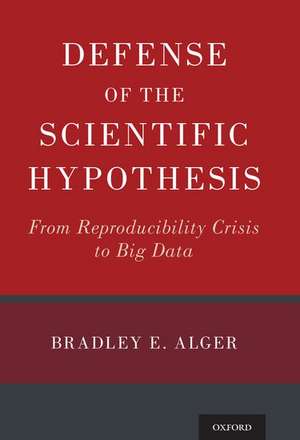Defense of the Scientific Hypothesis: From Reproducibility Crisis to Big Data
Autor Bradley E. Algeren Limba Engleză Hardback – 24 oct 2019
Preț: 336.88 lei
Nou
Puncte Express: 505
Preț estimativ în valută:
64.46€ • 67.47$ • 53.65£
64.46€ • 67.47$ • 53.65£
Carte disponibilă
Livrare economică 27 februarie-05 martie
Preluare comenzi: 021 569.72.76
Specificații
ISBN-13: 9780190881481
ISBN-10: 0190881488
Pagini: 448
Dimensiuni: 236 x 155 x 41 mm
Greutate: 0.75 kg
Editura: Oxford University Press
Colecția OUP USA
Locul publicării:New York, United States
ISBN-10: 0190881488
Pagini: 448
Dimensiuni: 236 x 155 x 41 mm
Greutate: 0.75 kg
Editura: Oxford University Press
Colecția OUP USA
Locul publicării:New York, United States
Recenzii
The book more than deserves a look for anyone interested in the intersection of philosophy and science.
In a time of great methodological and philosophical upheaval, the publication of this book is auspicious and has the potential to be of great benefit to both junior and senior researchers. It ties together different perspectives and provides practical advice. Academia will benefit if more of us reflected on the subject through books such as these.
In an age where scientific thinking is under attack, where big data analytics is marketed as the end of theory, and where social media spread fake news faster than facts, Alger's impressive book reminds us what a gift the scientific method is for each and every one of us. Its systematic steps can overcome mere opinion and targeted misinformation. But Alger also highlights that scientific training needs to be improved. For instance, although 70% of biological researchers report having received little or no training in scientific thinking, 90% nevertheless (or consequently) felt confident about their skills. Alger's writing is clear and engaging, and I truly enjoyed reading this insightful book.
I read with great interest and enthusiasm Defense of the Scientific Hypothesis. It was music to my ears. During my training with Sir John Eccles, I was immersed in Popper's philosophy of falsification and it has guided my thought and experimental design ever since. Alger gives a comprehensive overview of the central role that the hypothesis plays in driving science forward. His book should be recommended reading for any student of science and its accessible style and simple analogies will also appeal to non-scientists.
The scientific hypothesis is a unique tool for problem-solving that can be deployed to great advantage in nearly any setting. Brad Alger ranges across many disciplines to explore how the hypothesis helps to frame questions for scientists and non-scientists. He discusses the hidden dangers of the view that science involves gathering data to support preconceived notions rather than critically testing ideas, and how this attitude leads to poor decisions on societal issues such as climate change and science education. Defense of the Scientific Hypothesis is thoroughly rich and enlightening.
In a time of great methodological and philosophical upheaval, the publication of this book is auspicious and has the potential to be of great benefit to both junior and senior researchers. It ties together different perspectives and provides practical advice. Academia will benefit if more of us reflected on the subject through books such as these.
In an age where scientific thinking is under attack, where big data analytics is marketed as the end of theory, and where social media spread fake news faster than facts, Alger's impressive book reminds us what a gift the scientific method is for each and every one of us. Its systematic steps can overcome mere opinion and targeted misinformation. But Alger also highlights that scientific training needs to be improved. For instance, although 70% of biological researchers report having received little or no training in scientific thinking, 90% nevertheless (or consequently) felt confident about their skills. Alger's writing is clear and engaging, and I truly enjoyed reading this insightful book.
I read with great interest and enthusiasm Defense of the Scientific Hypothesis. It was music to my ears. During my training with Sir John Eccles, I was immersed in Popper's philosophy of falsification and it has guided my thought and experimental design ever since. Alger gives a comprehensive overview of the central role that the hypothesis plays in driving science forward. His book should be recommended reading for any student of science and its accessible style and simple analogies will also appeal to non-scientists.
The scientific hypothesis is a unique tool for problem-solving that can be deployed to great advantage in nearly any setting. Brad Alger ranges across many disciplines to explore how the hypothesis helps to frame questions for scientists and non-scientists. He discusses the hidden dangers of the view that science involves gathering data to support preconceived notions rather than critically testing ideas, and how this attitude leads to poor decisions on societal issues such as climate change and science education. Defense of the Scientific Hypothesis is thoroughly rich and enlightening.
Notă biografică
Bradley E. Alger (AB, UC Berkeley; PhD, Harvard), conducted some of the initial in vitro studies on synaptic plasticity in the brain for his thesis. In 1981, after serving as Roger Nicoll's first postdoctoral fellow at UC San Francisco, Alger was appointed Assistant Professor of Physiology at U Maryland School of Medicine. He did research and taught until becoming Professor Emeritus in 2014. Alger's laboratory published over 100 research articles and made fundamental discoveries regarding "the brain's own marijuana." While lecturing on scientific reasoning, he saw the need for a book like this one.
